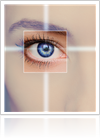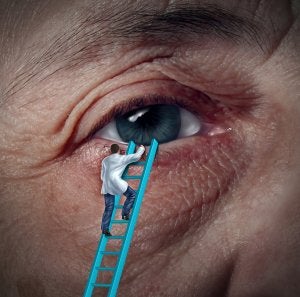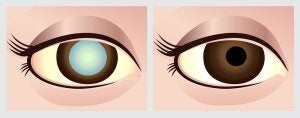-
Get the Facts About Cataracts
 Cataracts are common eye issues that tend to affect people as they age. Use this guide to learn more about cataracts and the problems they cause so you know when it is time to see an eye doctor in Chicago to help correct your vision issues:
Cataracts are common eye issues that tend to affect people as they age. Use this guide to learn more about cataracts and the problems they cause so you know when it is time to see an eye doctor in Chicago to help correct your vision issues:A Cataract
A cataract occurs when the lens of the eye gets cloudy. Most of the time, cataracts develop in older people, but they can happen to anyone of any age. By the age of 80, more than 50 percent of Americans have cataracts or have had custom cataract surgery to correct cataracts. Although this condition can happen in one or both eyes, it cannot spread from one eye to the other eye.
The Causes of Cataracts
The lens of the eye is comprised of mostly water and protein. In a healthy eye, the protein allows the light to travel clearly through it and to the retina. As the body ages, the protein might group together and create a cloud.
The Cataract and the Lens
Cataracts are a big deal because they make the lens cloudy . The lens is the part of the eye that focuses light on the retina, which allows you to see. If the lens is cloudy, the light cannot travel to the retina as well and it can severely hinder one’s ability to see. If you have blurry vision, you should schedule an appointment with an eye doctor in Chicago to see if you have cataracts.
The Kinds of Cataracts
In addition to a regular aging cataract, there are a few other kinds that could affect someone’s vision. A secondary cataract can develop after another kind of eye surgery. They can also be a side effect of health issues like diabetes or from steroid use. Traumatic cataracts might occur after an eye injury. Congenital cataracts can occur in babies or in young children. If your child has congenital cataracts, the eye doctor might need to completely remove the lens. Radiation cataracts might develop after exposure to radiation.
-
Spotlight on Dr. Craig H. Gerstein
 Dr. Craig H Gerstein is one of the best eye doctors in Chicago because he goes out of his way to ensure every patient gets the best service. Thanks to the talent of doctors like Dr. Gerstein, Gerstein Eye Institute helps patients fix their vision issues and improve the way they see.
Dr. Craig H Gerstein is one of the best eye doctors in Chicago because he goes out of his way to ensure every patient gets the best service. Thanks to the talent of doctors like Dr. Gerstein, Gerstein Eye Institute helps patients fix their vision issues and improve the way they see.After graduating with honors from Chicago Medical School, Dr. Gerstein completed an internship at MacNeal Hospital and his residency at Northwestern University Medical Center. On top of his work as an eye doctor, he also serves as an Assistant Professor of Ophthalmology at Northwestern University Medical Center.
Dr. Gerstein is board-certified by the American Board of Ophthalmology and a member of the American Academy of Ophthalmology, American Society of Cataract and Refractive Surgery, and Alpha Omega Alpha, the Honor Medical Society. He believes in using the latest technology and dedicated research to provide innovate and personalized care for every patient.
-
Reasons to Consider Having LASIK
 LASIK eye surgery is an effective way to correct refractive errors and improve the way you see. The procedure is a completely safe way to get better vision. If you are tired of relying on glasses or contact lenses, you should talk to your eye doctor in Chicago about the following benefits of this kind of eye surgery:
LASIK eye surgery is an effective way to correct refractive errors and improve the way you see. The procedure is a completely safe way to get better vision. If you are tired of relying on glasses or contact lenses, you should talk to your eye doctor in Chicago about the following benefits of this kind of eye surgery:It Brings You a Permanent Solution for Vision Problems
New advancements in eye surgery technology make the LASIK procedure more effective than ever before. The surgery actually changes the shape of your cornea, which helps light hit your retina the right way so you can enjoy perfect vision. Whether you are nearsighted or farsighted, LASIK can fix your issues. When you visit a reputable eye doctor for your LASIK procedure, you can enjoy lifelong results that eliminate the need to rely on glasses or contacts to see.
It Is a Quick and Safe Procedure
LASIK eye surgery is a painless way to correct your vision. The eye doctor can perform the surgery in less than 30 minutes. Since it is minimally invasive, there is very little downtime after the surgery is complete. The procedure is safe and helps you instantly improve your ability to see. Although you cannot drive on the day of your surgery, most patients can return to their regular schedules as early as a day after the procedure.
It Helps You See Your Best
While glasses and contact lenses provide an effective way to correct refractive errors, it is not ideal to have to rely on them to see. If you get LASIK eye surgery, you never have to worry about putting on glasses or popping in your contact lenses to see. You can have perfect vision as soon as you open your eyes in the morning without having to feel around for your corrective lenses. After a quick LASIK consultation and an even quicker procedure, you can enjoy improved vision that allows you to break your dependence on corrective lenses.
-
A Look at Cataracts
A lot of people deal with cataracts, especially in their older years. Once these clouds develop on the lenses, they will continue to get worse until they are treated. Custom cataract surgery in Chicago can target these problems on the lens to improve the way you see.
Cataracts affect the lens and hinder the way light hits the retina, which makes it more difficult to see. Without treatment from a qualified eye doctor, cataracts could eventually lead to blindness.
Check out this video to learn more about cataracts and how they can affect your vision. Schedule an appointment at a vision center near you to get a checkup and the treatment you need to improve your vision.
You can find the link here: http://youtu.be/K_jZCzRf4ww
-
Different Types of Cataracts

Cataracts develop with age and create cloudiness over the lens of the eye. Before you can get custom cataract surgery to improve your vision, you have to have a better understanding of the different kinds of cataracts. Keep reading to learn more about cataracts:
A Subcapsular Cataract
This kind of cataract develops at the back of the lens. Subcapsular cataracts usually start off as a small dot and gets in the way of light as it travels toward the retina. Because of its location, a subcapsular cataract typically affects one’s ability to read. It can also make it more difficult to see in bright lights. People with these kinds of cataracts might also start to see halos around lights at night. If you have any of these issues, you should schedule an appointment with your eye doctor in Chicago to see if you need cataract surgery.
A Nuclear Cataract
This kind of cataract develops in the center of the eye. Nuclear cataracts are usually a result of the natural aging process. When this kind of cataract first develops, it might make a person more nearsighted, but some people actually experience an improvement in their reading vision. A nuclear cataract can eventually turn the lens yellow or brown. Once it advances, it might make it more difficult to differentiate between shades of color.
A Cortical Cataract
Cortical cataracts start at the outer edge of the lens and move toward the center. Cortical cataracts worsen slowly, but when they finally reach the center, they can hinder the way light hits the lens. People who have this kind of cataract usually have difficulty seeing when there is a glare.
A Congenital Cataract
Although it is very rare, some people are born with congenital cataracts. They develop when a mother has an infection while pregnant or as a result of other conditions like myotonic dystrophy, galactosemia, Lowe’s syndrome, or rubella. If you suspect that you have any kind of cataract, it is important to visit your eye doctor to get the treatment you need.
-
Gerstein Wants to Hear From You!
Hey we’re always excited to hear from our happy patients and customers! If you’ve had a positive experience with Gerstein Eye Institute then review us on our Google my business page!
-
How LASIK Works
Have you heard of LASIK eye surgery? This procedure becomes more popular every year, allowing patients with a variety of vision problems to enjoy clearer and brighter vision without the use of eyeglasses or contact lenses!
Watch this video for a brief overview of how the LASIK eye surgical procedure works. The eye surgeon starts by cutting a flap in the cornea. This allows access to the eye’s interior so the laser can reshape the cornea to result in clearer vision. The laser works quickly, allowing most patients to walk in and out of the eye care center in 15 to 30 minutes!
If you are interested in learning more about LASIK eye surgery, it is important to find a professional and trustworthy ophthalmologist in Chicago .
-
Understanding the Basics of Cataracts
 How often do you visit a vision center ? Scheduling regular appointments with your ophthalmologist can help you protect your vision and eye health. These appointments can also help you learn how to spot the signs of cataracts as early as possible. Read this guide to understand the basics of cataracts:
How often do you visit a vision center ? Scheduling regular appointments with your ophthalmologist can help you protect your vision and eye health. These appointments can also help you learn how to spot the signs of cataracts as early as possible. Read this guide to understand the basics of cataracts:What are Cataracts?
Cataracts vision flaws that can develop naturally as people get older. Each eye features a lens that focuses what we see to give us clear vision. A cataract causes cloudiness in the lens, obstructing the clarity needed to accurately focus from the lens back to the retina. This results in blurry vison that cannot be corrected or improved without surgical intervention.
What Causes Cataracts?
The most common type of cataract is believed to be primarily caused by aging. The lens consists of protein and water. As we get older, the protein may shift and bunch together, resulting in cloudiness that affects vision quality. These clouds are small at first but grow over time, gradually making vision worse. Other habits and conditions can also put people at a higher risk for developing cataracts. The list includes smoking, medical conditions, eye health issues, and diabetes.
What are the Symptoms of Cataracts?
Because cataracts cause cloudiness over the lens, blurry vision is one of the most common and noticeable signs of their development. Cataracts can also cause colors to start fading and interfere with your night vision. Other common symptoms associated with cataracts include glare from natural and indoor lighting, double vision, and frequent changes in your eye prescription to adjust to constantly changing vision. If you experience any of these symptoms, you might want to schedule an appointment with your Chicago ophthalmologist.
How are Cataracts Treated?
New eyeglasses or contact lenses might help improve vision during the earliest stages of cataracts. Unfortunately, these options do not always work when cataracts become larger and have a greater impact on vision. If cataracts start affecting your ability to complete daily activities, you should meet with an ophthalmologist to discuss surgical treatment. During surgery, the lens is replaced with an artificial one that is not affected by cataracts.
-
Boosting Your Vision: Comparing LASIK and ICL [INFOGRAPHIC]
Are you tired of fumbling with glasses and contact lenses every day just so you can see clearly? Do you wish you could wake up in the morning with crystal clear vision? If so, it might be time to consult your eye doctor in Chicago to find out if LASIK or ICL might be right for you. LASIK eye surgery is a laser-assisted procedure that reshapes the cornea to correct nearsightedness, farsightedness, and astigmatism. ICL, or intraocular contact lenses, are implanted right in the eye and can correct moderate to severe nearsightedness. Take a look at this infographic from Gerstein Eye Institute, an eye surgery center in Chicago, to learn more about whether one of these procedures might be right for your vision. Please share this helpful information with your friends and family!

-
Meet Dr. Melvyn A. Gerstein
 This medical expert has the tools and knowledge to spot signs of problems and offer advice for protecting your eyes as you get older. Finding the right ophthalmologist is essential for creating the partnership needed to ensure your eye health and vision accuracy.
This medical expert has the tools and knowledge to spot signs of problems and offer advice for protecting your eyes as you get older. Finding the right ophthalmologist is essential for creating the partnership needed to ensure your eye health and vision accuracy.If you are looking for an eye doctor that will help you feel comfortable and confident, consider meeting with Dr. Melvyn A. Gerstein at Gerstein Eye Institute in Chicago . Dr. Gerstein has been providing excellent vision care to patients since earning his medical degree at the University of Illinois College of Medicine and more training from the Los Angeles County General Hospital and the University of Illinois Eye and Ear Infirmary in Chicago. Patients can feel comfortable knowing that Dr. Gerstein is certified by the American Board of Ophthalmology! He is also a member of the Honor Medical Society, American Society of Cataract and Refractive Surgery, and American Academy of Ophthalmology.
